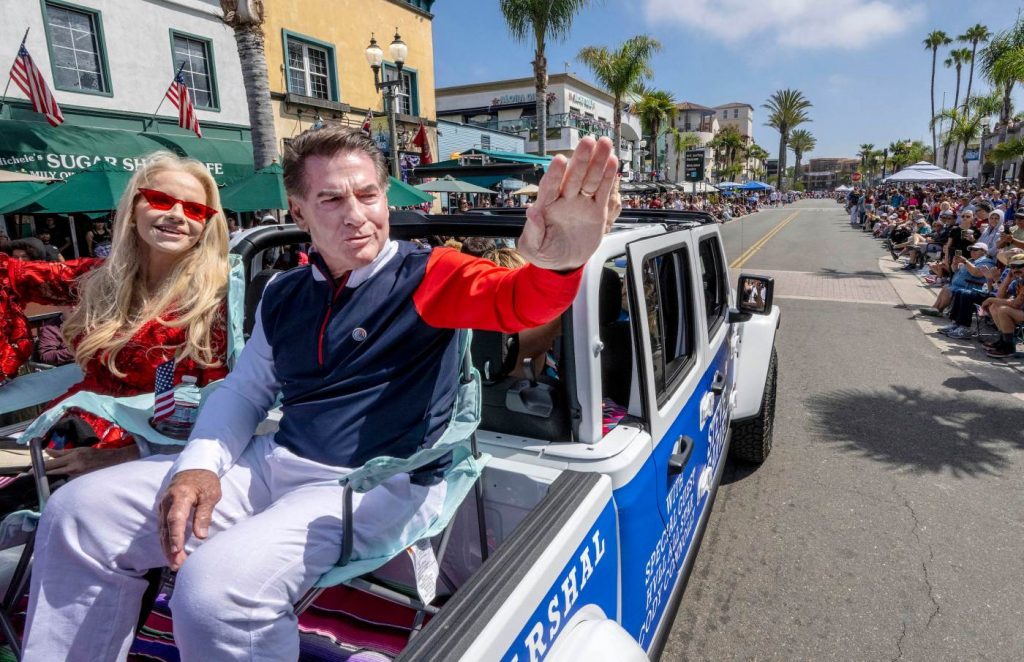Steve Garvey is not going to be the next U.S. senator from California.
He might do well in the upcoming March primary — and with some luck, the Republican candidate could even finish in first place in a field crowded with capable Democrats. But, to put that in terms the former Los Angeles Dodger and San Diego Padres first baseman might understand, that would be like winning his division, only to go on to face certain defeat in the playoffs.
That makes Garvey’s candidacy a puzzle, but it’s a mistake to see it as a serious attempt to win office. The last time Californians sent a Republican to the Senate was in 1988, when Pete Wilson won re-election only to then vacate his seat and become the state’s governor.
In the intervening decades, California adopted a top-two system for its statewide elections, which can dramatically affect campaign strategies. That means two candidates — irrespective of party — will emerge from the primary and compete in a runoff in November to succeed Laphonza Butler, Gov. Gavin Newsom’s replacement after Sen. Dianne Feinstein died in September. Soon after her appointment, Butler declared that she would not run for a full term, opening up the campaign to a host of contenders.
Three Democrats command the field. By every measure, the front-runner is U.S. Rep. Adam Schiff, the soft-spoken, temperamentally moderate, ideologically liberal former prosecutor perhaps best known for his work in pressing the first impeachment case against then-President Donald Trump. Schiff has raised the most money of any candidate in the race, and he leads in the polls.
Schiff had long been clear about his hopes to succeed Feinstein, so his place in the campaign is expected. Less expected were the candidacies of two other credible Democrats, Reps. Barbara Lee and Katie Porter. Both are serious, well-regarded liberals – the former representing Oakland the latter Orange County. Porter jumped into the race a year ago, before Feinstein announced her plans to retire. Lee disclosed her intentions a few days later.
Outcome still the same
That’s been the challenge: Lee hurts Porter, and Porter hurts Lee. Two progressive women are competing for the votes to Schiff’s left, and there just aren’t that many votes there to fight for.
One recent poll showed Schiff ahead, supported by about 21% of those surveyed, with Porter and Garvey fighting for second place and Lee trailing.
So maybe Garvey surges over the next few weeks. Maybe the state’s Republicans rally around him — though it’s hard to see why — and push him past Porter or even past Schiff. Let’s say he lands in the No. 1 or No. 2 spot for the runoff. What then?
Does anyone really think that Lee or Porter supporters would transfer their loyalties to a Republican, retired ballplayer — much less one who confronted a marital breakdown and paternity scandal that spawned the infamous T-shirt emblazoned “Steve Garvey is not my padre.”
The result is that Garvey’s candidacy creates froth but does not alter the fundamentals. As people hear he’s a Republican and in the race, he jumps up in the polls because he gives conservatives someone to back, and California has enough Republicans that it moves the needle on surveys and generates “shake-up” headlines.
That has real implications for Lee and Porter, but no real possibility of changing the political outcome in November. Indeed, the biggest beneficiary of all of this is Schiff, who may get the chance to face a Republican in November rather than a potentially wildfire-catching Democrat.
Garvey, those close to Schiff say, is their gift from heaven.
Style but no substance
The other clear indicator that Garvey is not really in this race to win is the way his campaign has approached it. His website extols his history as a ballplayer and businessman, “making him a true role model for those aspiring to leadership and success.”
He bravely takes stands against homelessness and “out-of-control inflation,” and he promises to “enforce our laws” and “invest in modernizing our military.” But he makes no effort to explain how he would address any of these problems. He has rationed interviews, confining himself to bland statements distancing himself from Trump, and limited his public appearances.
He is dodging attention instead of courting it. It almost goes without saying that his campaign did not return repeated interview requests for this column.
What that amounts to is that Garvey is running a campaign of vanity and self-regard. It may make sense as a matter of self-promotion, a way to raise his profile or get some airtime on Fox News. But it’s not a genuine attempt to engage issues and offer solutions that might actually help Californians.
Alan Cranston, the veteran California senator who knew this state’s politics better than just about anyone, understood the lure of public office and the thrill of running and imagining oneself in power (full disclosure: I interned at Cranston’s Washington office in the 1980s). Cranston liked to say that he never offered advice on who to marry or whether to run for office — in both circumstances, that person’s mind was always made up.
In Garvey’s case, he could’ve used that advice.
Jim Newton is a contributor to CalMatters. He worked at the Los Angeles Times for 25 years as a reporter, editor, bureau chief and columnist, covering government and politics.


